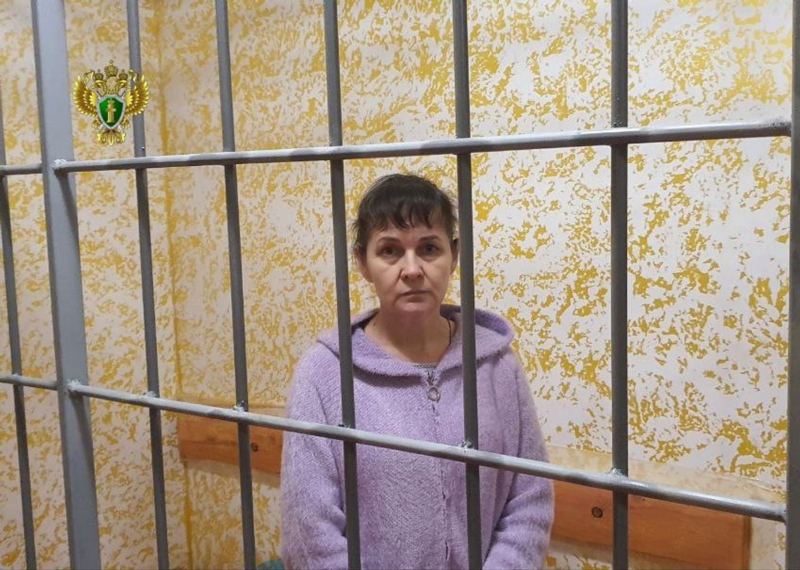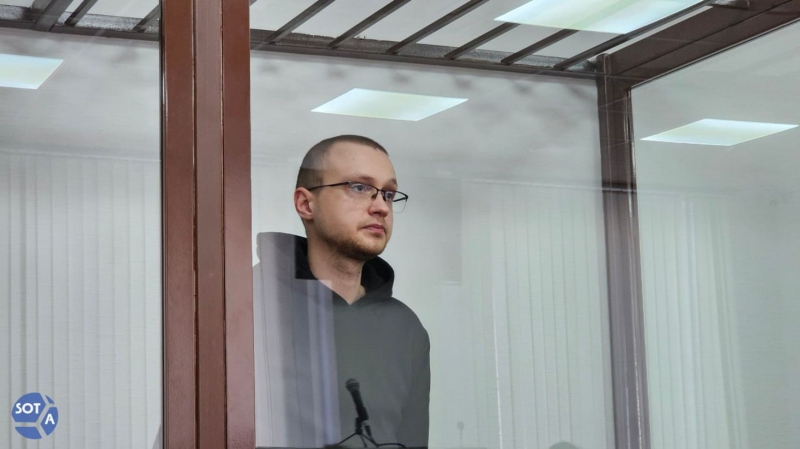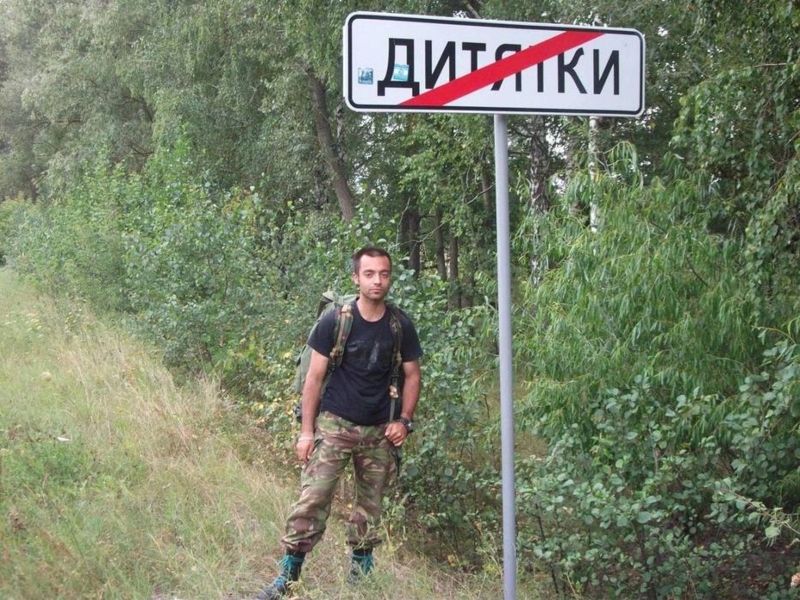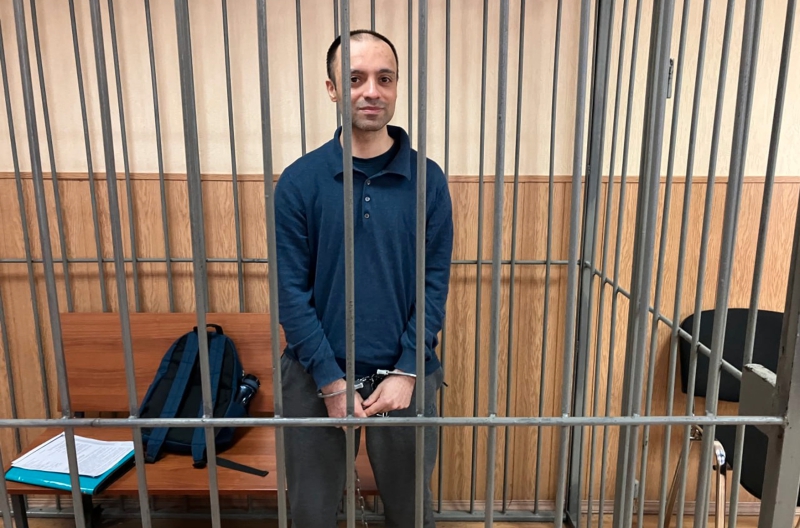Ruslan Sidiki, sentenced to 29 years in prison. Photo by Mediazona
According to The Insider's calculations based on available reports, in May Russian courts and those in the occupied territories handed down 73 politically motivated convictions that led to actual prison sentences, affecting 96 individuals. Forty were convicted on charges of “terrorism,” “sabotage,” “treason,” or“espionage.” Another 38 were Ukrainian prisoners of war, of which 35 were AFU soldiers captured in Russia's Kursk region. Finally, 18 people received prison terms for online comments, participation in protests, or involvement in banned organizations.
Due to the public holidays at the start of the month, the total number of politically motivated verdicts in May was lower than that of April. Nevertheless, Russian courts retained their usual pace of work — an average of four politically motivated sentences were handed down every working day.
The Insider chronicles the repression in a compilation of politically motivated verdicts for May. In addition to decisions made in May, the list includes sentences that were handed down earlier but were not publicly known.
“State treason, terrorism, sabotage, and espionage”
- April 9 — forced treatment in connection with “terrorism” and “treason”
The 1st Eastern District Military Court sentenced 34-year-old car mechanic Yevgeny Grigoryev from the Amur Region to compulsory treatment on charges of attempted state treason, preparation for participation in a terrorist organization, and facilitation of terrorist activities. The verdict became known on May 14. Even his sister does not know the substance of the charges against Grigoryev.
- April 10 — sentences handed down to one Russian and one Ukrainian
The 2nd Western District Military Court sentenced Ukrainian national Oleh Zabolotnyi to 25 years in prison and Russian national Maxim Volga to 19 years in a case that involved preparing an assassination attempt against a high-ranking Russian military officer. According to the court's version of events, the pair acted on the instructions of the Ukrainian security services. Russian national Volga ostensibly delivered weapons and explosives to Voronezh, while Ukrainian national Zabolotnyi made a bomb and intended to plant it on the target’s staircase. The court found them guilty on several counts, including attempted terrorist acts, espionage, and treason. The Federal Security Service reported the verdict only on May 29.
- April 18 — six years for a hack
“He’s only 18, just a kid — but doing something 99% of Russians wouldn’t dare to.”
This is how the Ukrainian hacker group Cyber Anarchy Squad, which the FSB says the young man was a part of, commented on the sentencing of Seymur Israfilov. Israfilov was accused of a series of cyberattacks against the assets of the Tomsk city administration and a research facility of Tomsk Polytechnic University. The court sentenced him to 6 years and 3 months in prison for state treason and the distribution of malware.
- April 30 — a sentenced teenager
Danila Vorobyov, 17, was sentenced to 6.5 years in prison in a case involving the arson of a battery cabinet on a railroad in the Kaluga Region. According to the court, an individual “actively supporting the Armed Forces of Ukraine” contacted the teenager on a messenger app, offering him 50,000 rubles ($630) to commit arson and make a video of the act with his phone.
- May 5 — 10 years for “preparing to commit treason”
A court in Samara sentenced an unnamed man to 10 years in prison for his alleged intention to join the Armed Forces of Ukraine. The defendant was found guilty of preparing to commit state treason and participating in a terrorist organization. Ostensibly, he entered into correspondence with a military formation recognized in Russia as a terrorist group. In the messages, he agreed on the procedure and date for crossing the Russian border. He was detained “en route to the Russia-Kazakhstan border.”
- May 7 — 18 years for “collusion with the Azov Battalion,” a Ukrainian military unit
Alexander Bogdanov, a 41-year-old resident of the Stavropol Krai, was sentenced to 18 years in prison on charges of collusion with Ukraine's Azov Brigade. The court's press service claims that Bogdanov, while working at a defense industrial enterprise, recorded a video message in which he swore an oath to Azov. He also bought the necessary ingredients for making homemade explosives and sent footage of his stock to an alleged member of Azov. Bogdanov was detained 10 days later.
- May 12 — a “lesson” for teenagers
“I hope this will be a lesson for you, Khazov and Nevolainen.”
This is how Judge Andrei Karnaukhov commented on the verdict of 16-year-old Pavel Khazov and 17-year-old Kosmos Nevolainen, who were sentenced to 9 and 6 years of imprisonment, respectively. The judge found the teenagers guilty of committing terrorist acts by setting fire to a diesel locomotive and a cell phone tower in the Vologda Region. “If it weren’t for the Special Military Operation [Russia's war of aggression in Ukraine], they would be tried not for terrorism, but for property damage,” noted Nevolainen’s lawyer.
In Novosibirsk, a court sentenced Sergei Kondakov, 39, to 10 years behind bars. According to the court, Kondakov set fire to a relay cabinet for financial gain, acting on the instructions of a handler in Ukraine. “The unlawful actions of Kondakov created a threat to railway security and caused train delays,” the court claims.
- May 13 — 17 years for complicity in the attempted assassination of a representative of the occupation authorities
The Southern District Military Court in Rostov-on-Don sentenced Ukrainian national Andriy Seryozhenko to 17 years in prison. Seryozhenko was found complicit in the attempted assassination of Yevgeny Sobolev, head of the penitentiary department of the occupation authorities of Kherson Region. His actions were categorized as an act of international terrorism. On June 18, 2022, Sobolev's car was blown up in Kherson, injuring the prison official.
- May 14 — sentences for detainees in the occupied territories and a resident of St. Petersburg
Two Ukrainians detained in 2022 in the occupied territories — Oleh Zavhorodnyi and Fedor Tryfonov — were sentenced in Rostov-on-Don to 24 and 17 years in prison, respectively. They were accused of participating in a terrorist group and plotting to blow up a Russian military convoy in the occupied part of the Zaporizhzhia Region.
Oksana Shevchenko, 45, a native of Ukraine's Zaporizhzhia Region, was sentenced to 10 years in prison on charges of preparing an assassination attempt on the head of the occupation administration of Crimea, Sergey Aksyonov.
A military court in St. Petersburg handed down a sentence to Bogdan Bondarev, 22, who was accused of destroying a relay cabinet and making 16 leaflets “that said bad things about the Russian president.” As 47news reported, the Freedom of Russia Legion allegedly tasked Bondarev with monitoring the operations of Russia's defense enterprises, including the Nevsky Mazut plant, the premises of which were hit by a drone on Jan. 31. Bondarev was found guilty of state treason, sabotage, and participation in a terrorist organization. The terms of his sentence, first reported by The Insider, are unknown.
- May 15 — 13 years for graffiti
“The Russian army's war losses killed are about 500,000.”
— This caption on a bus stop cost Sergei Veselov, 27, from Elektrostal near Moscow, 13 years in prison. He was found guilty of vandalism, spreading fakes about the Russian army, and participating in a terrorist organization. The latter charge is related to the fact that, according to the court, Veselov painted the graffiti at the instruction of the Freedom of Russia Legion.

- May 19 — provocateur in the dock, funding of the AFU, sentence for a Ukrainian woman
A court in Yekaterinburg sentenced three young men in a case of arson against relay cabinets. One of the men, Arseny Klimin, 20, had been recruited by the Center for Combating Extremism (the notorious “Center E” of the Ministry of Internal Affairs) to provoke the other two defendants, Danila Eliseev and Nikita Sukhorukov, to commit arson. However, Klimin also expected to receive payment for the arson from the Freedom of Russia Legion. As a result, the double agent ended up in the dock along with his victims. Klimin received eight years, and Eliseev and Sukhorukov seven years each.
The military court in St. Petersburg sentenced Daniil Galitsky, a 24-year-old student of Herzen State Pedagogical University, to 13 years in prison on charges of state treason and justification of terrorism. The trial was held behind closed doors. The details of the case were not disclosed, but according to Mediazona's source, Galitsky was charged with financing the AFU.
The Russian occupation court in Ukraine’s Kherson Region sentenced 52-year-old Ukrainian national Svitlana Shevchuk to 12 years in prison on charges of espionage and storage of explosives. According to the court, Shevchuk collected data on the movement and on the locations of Russian military vehicles and personnel, passing the information along to Ukrainian intelligence agents. In addition, Shevchuk allegedly received explosives and explosive devices from Ukrainian handlers and kept them at her home.

- May 20 — sentences for an anarchist, a software developer, and a teenager
A military court in Yekaterinburg sentenced anarchist Alexei Rozhkov, who had been kidnapped by Russian security forces in Kyrgyzstan and brought to Russia in 2023, to 16 years in prison. Rozhkov was tried for setting fire to a military enlistment office in March 2022 and giving an interview to the YouTube channel Khodorkovsky LIVE. The court found Rozhkov guilty of committing a terrorist act, justifying terrorism, and spreading fakes about the Russian army.

A court in Irkutsk sentenced software developer Alexander Levchishin to 14 years in prison on charges of state treason in connection with his involvement in «programs designed to unlawfully affect critical information infrastructure, causing serious consequences.» Before his arrest, Levchishin worked in a hospital and was a blood and bone marrow donor. According to the court, Levchishin leaked the electronic medical records of Russian servicemen to Ukraine and donated 1,400 rubles ($17.60) for an ambulance for Ukrainians.
An unnamed 16-year-old resident of Arkhangelsk was sentenced to six years in prison for setting fire to a United Russia office, which resulted in two rooms being severely damaged. Vladislav Zhgilev, a member of United Russia, reported that one of the rooms had contained humanitarian aid intended for orphanages in the occupied territories, and also aid for Russian troops. The damage was estimated at 2.6 million rubles ($32,700), and the arson was qualified as a terrorist act.
- May 22 — involvement in terrorism, failed attempts, and confidential collaboration
Gennadiy Kalashnikov, a 45-year-old native of the Luhansk Region, was sentenced to 15 years in prison for inciting extremist activity, justifying terrorism, and involving others in terrorist activity. The first two charges are based on Kalashnikov's comments on Telegram: “Death to Putin's orcs” and “Glory to the Russian Volunteer Corps.” As for the charge relating to “terrorist activity,” Kalashnikov was prosecuted for his correspondence with his son, a contract soldier in the Murmansk Region who was later sent to Ukraine. According to the prosecution, the father wrote to his son: “Let's join the Russian Volunteer Corps?” The son declined, and the father was sent to jail.
Mikhail Timakov, 21, a native of the Novosibirsk Region, was sentenced to 14 years in prison for an alleged attempt to blow up a traffic police station in the Belgorod Region. According to the court, Timakov traveled from Siberia on the instructions of unidentified persons, took a bomb from a cache, and activated it outside the police station in the town of Stroitel. He was detained by FSB officers on the spot.
St. Petersburg native Alexei Palchikov, 36, was also convicted of preparing an explosion in the Belgorod Region. According to the court, on Mar. 7, 2024, Palchikov, working at the instruction of the Russian Volunteer Corps, planted a bomb at the entrance to the House of Officers, which hosted a polling station for the presidential election that was scheduled for the following week. The bomb was reportedly discovered. Palchikov was arrested, tried, and sentenced to 18 years in prison.
Alexei Detychev, the deputy chair of the Red Cross in the Khabarovsk Krai, was sentenced to 4.5 years of imprisonment for alleged “confidential cooperation” with a British agent. According to the court, Detychev approached the agent with a proposal to spread anti-Russian propaganda among young people “in exchange for political asylum.” He was also charged with passing along information about the work of regional defense enterprises.

- May 23 — a “terrorist attack” prompted by phone scammers and a record sentence for sabotage
A military court in St. Petersburg sentenced Yuri Petrash, 22, to 10 years in prison for committing a terrorist act. According to the court, Petrash set fire to the doors of the FSB building on Liteyny Prospekt in February 2024 on the instructions of telephone scammers. The fire did not ignite, and so the resulting damage was minimal.
A court in Novosibirsk sentenced Nikita Stepanov, 17, and Sergei Ivanov, 20, to six and 12 years in prison, respectively. The young men were found guilty of sabotage — namely, the arson of a relay cabinet. According to the court, an unknown individual messaged Stepanov and offered him 20,000 rubles ($253) for setting the cabinet on fire.
The 2nd Western District Military Court sentenced Russian-Italian citizen Ruslan Sidiki (Siddiqui) to 29 years in prison for staging a UAV attack on the Dyagilevo military airfield and blowing up a rail track used by the military in the Ryazan Region. This is a record term for actions that resulted in no fatalities. Ruslan Sidiki considers himself a guerrilla, and his defense demands that he be recognized as a prisoner of war and exchanged.

- May 26 — 12 years for donations and leaflet pasting
A court in St. Petersburg sentenced Vladimir Skvortsov, a 43-year-old Russian Post employee from Vologda, to 12 years in prison for donating to the late Alexei Navalny's Anti-Corruption Foundation (financing extremist activity) and pasting leaflets in support of the Freedom of Russia Legion (participation in a terrorist organization). According to the prosecution, in 2021 Skvortsov made four donations to the ACF, and in the summer of 2024 he distributed Legion leaflets in Vologda, for which he initially received an administrative penalty.
- May 27 — “state treason” in the occupied territory
The occupation Supreme Court of the so-called Luhansk People's Republic sentenced Stanislav Udoviki, 21, to 17 years in prison on charges of state treason. According to the prosecution, Udoviki passed data about the locations of Russian troops in the occupied territories to the Ukrainian security services.
- May 28 — 18 years for “treason” and “terrorism”
A military court in Khabarovsk sentenced Yakutsk resident Yan Borisov, 34, to 18 years in prison on charges of state treason, training in terrorism, participation in a terrorist organization, and justification of terrorism. The details of his case are unknown.
- May 29 — attempt to join the Russian Volunteer Corps, arson of relay cabinets, and money transfer to Ukraine
The Southern District Military Court in Rostov-on-Don sentenced Crimea resident Dmitry Adamenok, 37, to 12 years in prison for an alleged attempt to join the Russian Volunteer Corps. Adamenok was found guilty of preparing to commit state treason, attempting to participate in a terrorist organization, and justifying terrorism online.
The Saratov Regional Court sentenced three locals to terms from 16 to 18 years for setting fire to relay cabinets and a mobile operator's station. Yury Aksenov received 16 years, while Dmitry Aksenov and Vlas Shirokov got 18 years each. According to the court, they acted on the instructions of Ukrainian intelligence and were guilty of sabotage and state treason. Dmitry Aksenov was paid for the arson in cryptocurrency, which the court qualified as laundering of criminal proceeds.
The Supreme Court of the so-called Donetsk People's Republic sentenced Yenakievo resident Sergei Shtyrov, 60, to 13 years in prison for transferring money to Ukraine. According to the court, he knew in advance that the funds would go to the needs of the AFU. Shtyrov was found guilty of state treason.
PoW trials
In May, judges of Moscow's 2nd Western District Military Court passed sentences on AFU servicemen who had fallen into Russian captivity in the Kursk Region. Over the course of the month, 27 such verdicts were handed down against 35 prisoners of war. All of them were found guilty of terrorism, which is how the Russian authorities interpret the very fact of their presence onRussian territory. The sentences range from 14 to 17 years in prison.
On May 5, Viktor Isayev, a junior sergeant of a rocket launcher squad of the AFU, was sentenced to 17 years in prison.
On May 6, Ukrainians Mykola Chovgan of the AFU's 21st Separate Mechanized Brigade, Lev Kyrov of the 17th Separate Tank Brigade, and Ruslan Poltoratskiy, squad commander of the 80th Separate Airborne Assault Brigade, were sentenced to comparable terms in three separate trials.
On May 12, Andriy Vlasenko, a senior soldier of the 134th Separate Guard and Logistics Battalion of the AFU, was sentenced to 17 years in prison.
On May 13, verdicts were handed down to Bohdan Kolomiiets of the AFU's 21st Separate Mechanized Brigade and Andriy Shulgan of the 82nd Separate Airborne Assault Brigade. Both were sentenced to 15 years in prison.
On May 14, three Ukrainian servicemen were sentenced to 16 years in prison each: soldier of the 17th Separate Tank Brigade Oleksandr Pryimachuk, senior sergeant of the 22nd Separate Mechanized Brigade Denys Pysachenko, and senior soldier of the 44th Separate Mechanized Brigade Viktor Kyrpychenko.
On May 15, Moscow judges also handed down three verdicts. Anton Frolkin, a soldier of the 17th Separate Tank Brigade of the Ukrainian Armed Forces, was sentenced to 15 years in prison, while vehicle technician of the 4th Rapid Response Commandant’s Office Anton Borymskyi and platoon commander of the 21st Separate Mechanized Brigade Dmytro Yaremov were each sentenced to 16 years.
On May 16, Serhii Shapoval, a soldier of the 129th Separate Territorial Defense Brigade of Ukraine, was sentenced to 16 years in prison.
On May 19, Serhii Chumasov, a soldier of the AFU's 17th Separate Tank Brigade, was sentenced to 15 years in prison, while Oleh Zaderei, a senior seaman serving in the 1st Separate Tank Brigade, was sentenced to 17 years.
On May 20, Vitaliy Lutsenko, a senior soldier of the 33rd Separate Assault Battalion of the AFU, was sentenced to 16 years in prison.
On May 22, a Moscow judge handed down a 16-year prison term to Andrei Pasko, a sailor of the 36th Separate Marine Brigade. In a separate trial, five Ukrainian servicemen from the 82nd Separate Air Assault Brigade and the 154th Separate Mechanized Brigade were convicted. Yaroslav Zubrytskyi and Andrii Dolhyi were each sentenced to 18 years in prison, while Oleksii Bolshakov, Arsen Stehar, and Mykhailo Shkoda received 17 years each.
On May 23, a 16-year prison term was handed to Roman Bura, a soldier of the 95th Separate Air Assault Brigade of the AFU.
On May 26, assistant grenadier Vasyl Patlachuk and driver Petro Voit, both servicemen of the 144th Separate Infantry Brigade of the AFU, were each sentenced to 15 years in prison, while rifleman Roman Romakin received 14 years.
On May 27, Serhii Palaida, a serviceman of the 47th Separate Mechanized Brigade of the AFU, was sentenced to 15 years in prison, while senior soldier Oleksandr Maslinkov of the 17th Separate Tank Brigade received 16 years.
On May 28, Vadym Razhon, Vitalii Solodukha, and Dmytro Sankevych, servicemen of the 2nd Border Detachment of the State Border Guard Service of Ukraine, were sentenced to terms ranging from 15 to 16 years. In a separate trial, Mykola Popovych, assistant grenadier of the 17th Separate Tank Brigade, was sentenced to 16 years in prison. On the same day, Mykola Shevchenko, a radio-telegraph driver of the same brigade, was sentenced to 17 years in prison.
On May 30, Maksym Levchenko, machine gunner of the 17th Separate Tank Brigade of the AFU, was sentenced to 16 years in prison.
All but three of the sentences handed down to Ukrainian prisoners of war in May were related to the AFU’s operation in the Kursk Region of Russia.
On May 16, the occupation Supreme Court of the so-called Luhansk People's Republic sentenced Australian citizen Oscar Charles Augustus Jenkins to 13 years in prison for mercenarism. This is the first known verdict against an Australian national for participation in the AFU.
On May 22, the Southern District Military Court in Rostov-on-Don sentenced Ihor Varchuk, a fighter of the 48th Noman Çelebicihan Separate Assault Battalion, to 20 years in prison for terrorism. Composed of Crimean Tatar volunteers, the unit is recognized as a terrorist organization in Russia.
On May 29, the Kamennobrodsky District Court in Luhansk sentenced Ukrainian national Oleksandr Verba, 46, to 5.5 years in a general security prison for participation in an extremist organization. According to the prosecution, from October 2022 to April 2024, Verba fought against Russia as part of the 67th Separate Mechanized Brigade of the AFU, which was formed from members of the Right Sector — an organization banned in Russia as extremist.
Terms for online comments, civil protests, and participation in banned organizations
In May, courts in Russia and the occupied territories continued to hand down prison terms for online comments, participation in protests, and association with organizations recognized in Russia as extremist or undesirable. A total of 11 publicly known verdicts corresponding to these categories were registered in May against 18 defendants.
On May 5, another sentence was handed down to the defendants in the Baymak protests case. Akhat Gibadullin, Galim Zamanov, Ilnur Khazhiev, Dinar Akbalin, Dayan Valeev, and Dim Davletkildin were sentenced to terms ranging from 5 to 5.5 years in prison. They were found guilty of participating in mass riots and of using non-life-threatening violence against a government official.
On the same day, human rights activist Ruslan Nurushev was sentenced to six years in prison for “spreading fakes” about the Russian army. The prosecution built its case on a VKontakte post describing a missile strike on a café in Kharkiv. Nurushev pleaded not guilty, stating that his post did not contain any elements of a crime.
On May 12, a military court in St. Petersburg sentenced transgender woman Olga Sivushkova, 37, to four years in a penal colony on charges of justifying terrorism. Sivushkova's case was built on her Telegram post containing a link to Mark Feygin's interview with a fighter from the Freedom of Russia legion. Earlier, Sivushkova acted as an informant for the Russian Interior Ministry’s Center E (a special unit combating extremism) in the New Greatness case under the pseudonym Koshka and served in the Israeli army. While in pre-trial detention, she complained about facing pressure. She went on a hunger strike and stated that she had given her testimony as part of a deal for receiving a suspended sentence.
On May 14, Grigory Melkonyants, co-chair of the Golos movement, was sentenced to five years in prison on charges of organizing the activities of an “undesirable” organization — the European Network of Election Monitoring Organizations (ENEMO), which allegedly included Golos. However, the Russian authorities have not declared the Golos movement itself to be an “undesirable” organization.
On May 20, a military court in Yekaterinburg sentenced Makar Nikolaev, a 20-year-old student from Ufa, to six years in a general security penal colony for justifying terrorism via his comments under posts by the Russian Volunteer Corps and the Freedom of Russia Legion. Nikolaev was detained in August 2024 after his return from an academic trip to Germany.
On May 21, the Krasnodar Krai Court sentenced local resident Vladimir Yarotsky to five and a half years in a penal colony on charges of spreading “fakes” about the Russian army and desecrating a symbol of military glory. The case was prompted by his post featuring an image of the St. George’s ribbon tied on a penis, along with another post about the deaths of Russian soldiers in Ukraine. Previously, Yarotsky had been sentenced to 18 months in a settlement-type penal colony, but his case was returned for review, and a new charge was added.
On May 28, the Southern District Military Court in Rostov-on-Don sentenced Alexander Pogorelov, Dzhamal Mamatkulov, and Roman Myskov to terms ranging from 5.5 to 6.5 years in a general security penal colony for making public calls for terrorism. According to the investigation, in March 2023 the men recorded and uploaded a video online containing calls for violence against authorities. In the video, they wore camouflage and held mock weapons while standing in front of a fake sign of the Moscow Region locality “Lovtsovo.”
On May 29, Konstantin Ledkov, a librarian from the Arctic settlement of Krasnoye, was sentenced to 5.5 years in a penal colony on multiple counts: participation in the propaganda of Nazi symbols, discrediting the army, and making calls for undermining national security. The case was prompted by Ledkov's anti-war statements, social media posts, and his utterance “Glory to Ukraine!” — made in a bar and reported by fellow villagers.
On the same day, the Obninsk City Court in the Kaluga Region sentenced local resident Zakhar Petukhov to two years of community service with 10% of his earnings withheld for the benefit of the state, on charges of spreading “fakes” about the Russian army. The case was based on a message he posted in a residential group chat about Russian soldiers killing civilians in Bucha. The court ruled that the message “discredited the army” and caused “anxiety and fear” among chat participants.
Also on May 29, the 1st Western District Military Court in St. Petersburg sentenced Yuri Zhgutov, a 41-year-old crane operator from the village of Bugry in the Leningrad Region, to five years in a penal colony on five counts of justifying terrorism. According to the investigation, since 2023 Zhgutov had posted over 2,700 comments in the Telegram channel Supernova+, expressing his approval of the March 2024 terrorist attack at Crocus City Hall and the Ukrainian shelling of Belgorod. Zhgutov pleaded guilty, expressed remorse in his final statement, and begged the court for lenience, citing his child’s illness and his mother's death. The human rights project “Support for Political Prisoners. Memorial” provided the following comment on this complex case for The Insider:
“Justifying the mass killing of civilians is, after all, only one of several episodes, and the actual public danger of such justification — in the present context — is insignificant. We are unlikely to secure his recognition as a political prisoner, but signs of political motivation and legal violations in his case are clear.”
This list of convictions is a compilation of reports from public sources and cannot be considered exhaustive. Courts and press services of law enforcement agencies do not disclose some of their rulings, and journalists attend a small overall percentage of Russian court hearings. For cases in which it is impossible to determine the exact date of sentencing, the date of the first media reports is provided. The list does not include convictions in absentia and covers only cases in which defendants were physically deprived of their freedom.

